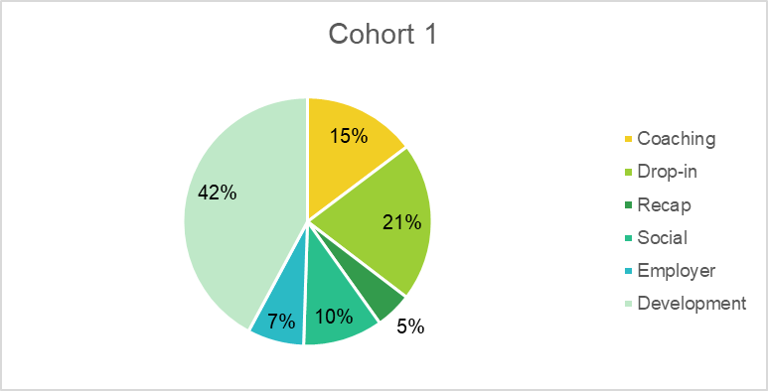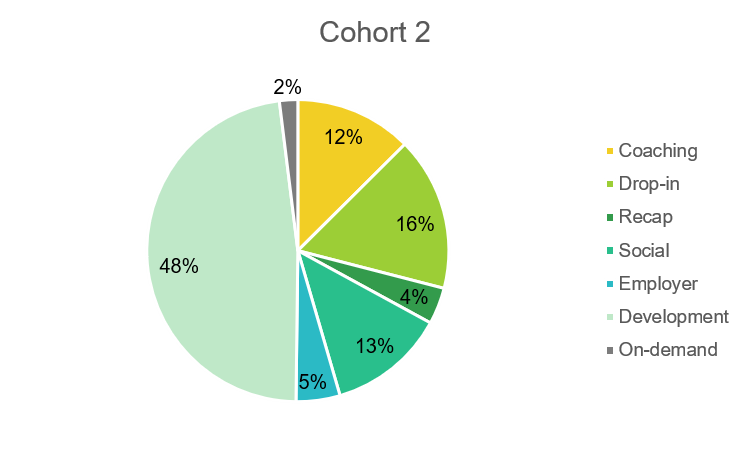How Prosper ran its two pilot cohorts
- We had funding from Research England to buy-out 0.1 FTE of the postdocs contracted time
- We were simultaneously developing, co-creating, testing and adapting all our Prosper as we went
- We had set targets to recruit postdocs across all disciplines and EDI characteristics
- We had success measures around broadening postdocs career aspirations beyond academia
- Cohort 1 ran from April 2021 to March 2022, so due to COVID measures and social distancing almost all sessions were delivered virtually
- Cohort 2 ran from February 2022 to January 2023, across three institutions so almost all sessions were delivered virtually
- All live sessions had an analogous on-demand version
- We tracked the number of hours cohort members engaged with Prosper via pulse and end of cohort surveys (hours were self-reported)
Consultation prior to our first pilot cohort
Prior to our first pilot cohort we ran a consultation with PIs/managers of researchers and postdocs at the University of Liverpool.
Questions we posed to postdocs
The following questions were posed via an anonymous online survey.
- What opportunities could this postdoc cohort phase offer you?
- What questions do you have about the phase and how it would work alongside your research role?
- How could we best promote this opportunity to you and other postdocs?
- Do you have any other comments or feedback?
Associated document: Postdoc consultation document
Questions we posed to PIs/ managers of researchers
The following questions were posed via an anonymous online survey.
- What opportunities could the postdoc cohort phase of Prosper offer you and your postdoc(s)?
- How could you promote this opportunity to your postdocs, particularly those who you feel may not normally engage with development opportunities, and what materials would help you to do this?
- Do you manage a researcher who you think should be eligible to apply but doesn’t meet our definition of a postdoc?
- What questions does the cohort phase raise for you or for your postdocs?
- How do envisage your postdoc’s participation could work alongside your research project and its deliverables?
- Do you have any other comments or feedback to share with us regarding our postdoc cohort phase provision?
- In which faculty are you currently based?
Associated document: PI consultation document.
We recruited postdocs into a total of two pilot cohorts, postdocs were recruited from all disciplines, with no requirement that they had a pre-determined idea of their career trajectory. Each cohort lasted 12 months. The first pilot cohort comprised 53 postdocs all employed at the University of Liverpool. The second pilot cohort comprised 75 postdocs from across Lancaster University, University of Liverpool and University of Manchester.
As we had funding from Research England to buy-out 0.1 FTE of their contracted time we required that postdocs had at least 6 months time left on their contracts at the start of the cohort (only for cohort 2). We found that the postdocs didn’t go appreciably above the time stated in the researcher development concordat even with the 0.1 FTE buy-out. The researcher development concordat states that researchers should have 'a minimum of 10 days professional development pro rata per year’. This equates to a minimum of 70 to 80 hours of professional development per year. Cohort 1 members spent on average 100 hours over 12 months on their Prosper career development, as self-reported in our evaluation surveys.
Overview of first pilot cohort by session type

| Session types | Number of sessions | Total number of hours |
|---|---|---|
| Drop-in | 26 | 26 hours |
| Recap | 6 | 6 hours |
| Social | 13 | 13 hours |
| Employer | 12 | 9 hours 15 mins |
| Development (Prosper) | 7 | 7 hours |
| Development (Commissioned) | 27 | 46 hours |
| Coaching 1:1 (per person) | 3.5 | 3 hours 30 mins |
| Coaching group (per person) | 15 | 15 hours |
During cohort 1 we delivered a total of 91 sessions, totalling 107 hours 15 mins (from 29/04/21 to 29/03/22). We’ve classified the types of activities we scheduled for cohort 1 into six types; coaching, drop-in, recap, social, employer and development. All career coaching was delivered by five commissioned external career coaches.
Each member of cohort 1 was allocated a total of 3.5 hours of 1:1 career coaching, plus 15 hours of group career coaching across the 12 months of the cohort. Postdocs were assigned coaching groups with a broad aim to get groups of mixed discipline, gender and ethnicity as far as possible. No group coaching group exceeded 11 postdocs. Postdocs were assigned to the same career coach for both group and 1:1 coaching. See tables 4 and 5 for details of the coaching allocated versus used.
Session types
Drop-in sessions were informal sessions provided as an opportunity for the cohort to talk to a member of the Prosper team about any aspect of their career development journey.
Employer sessions were sessions where cohort postdocs directly interacted with employers. These sessions were things like employer panel/s, with multiple employers discussing a topic or ‘fireside chats’ with one employer giving an insight into their sector, company or role.
Development sessions were either created and delivered by the Prosper team or a commissioned external supplier. Development sessions were focussed around a specific topic and had a practical output or objective for the postdocs. Session topics included communication skills, creativity, and leadership skills.
Recap sessions were designed and run by the Prosper team, giving a rapid overview of session highlights from the prior few months. These recaps allowed postdocs to re-engage and orient themselves with sessions they’d missed and prioritise what resources they’d like to engage with.
Social sessions were virtual sessions with the expressed aim to encourage networking and social interaction between the postdoc cohort members. For more details on running social sessions see our page on how to run social sessions.
Buddy scheme
A peer support ‘buddy’ scheme was first trialled (opt-in) towards the tail end of cohort 1. This buddy scheme was adapted and trialled with cohort 2, initially as a compulsory activity then as opt-out, then finally as opt-out but run over a longer period of time. The buddy scheme is not included in the cohort 1 or 2 time pie charts. For more details on the buddy scheme, including how to run one see our page on how to run a buddy scheme.
Overview of second pilot cohort by session type

| Session types | Number of sessions | Total number of hours |
|---|---|---|
| Drop-in | 21 | 21 hours |
| Recap | 5 | 5 hours |
| Social | 13 | 16 hours |
| Employer | 4 | 6 hours |
| Development (Prosper) | 34 | 42 hours 45 mins |
| Development (Commissioned) | 14 | 18 hours 15 mins |
| On demand | 2 | 2 hours 30 mins |
| Coaching 1:1 (per person) | 1 | 1 hour |
| Coaching group (per person) | 15 | 15 hours |
| Career coaching type | Number of sessions | Total number of hours |
|---|---|---|
| One to one | 1 | 1 hour |
| Group | 15 | 15 hours |
Differences between first and second pilot cohort
Career coaching
The main differences between cohort 1 and 2 was that the number of 1:1 career coaching hours were reduced and developmental sessions were re-delivered for cohort 2. A couple of sessions were also just provided as on-demand resources, mentioned in other live sessions. Each member of cohort 2 had a total of 1 hour of 1:1 career coaching, plus 15 hours of group career coaching available to them across the 12 months of the cohort. See the career coaching comparison hours in tables 4 and 5.
| Cohort 1 | Cohort 2 | |
|---|---|---|
| Number of postdocs | 53 | 75 but only 73 were assigned to coaches |
| Number of coaching groups | 6 | 8 |
| Total number of hours allocated | 90 | 120 |
| Total number of hours used | 81 | 118 |
| Percentage hours used | 90% | 98% |
| Cohort 1 | Cohort 2 | |
|---|---|---|
| Number of postdocs | 53 | 75 but only 73 were assigned to coaches |
| Total number of hours allocated | 182 | 73 |
| Total number of hours used | 174.5 | 60 |
| Percentage hours used | 96% | 82% |
Attendance
At a cursory look across the two pilot cohorts we couldn’t find a clear trend in attendance of morning versus afternoon sessions (we had one cohort with a slight preference for morning, one with a slight preference for afternoon).
Both pilot cohorts had the best attendance on a Friday compared to other days of the week. However, we found no clear ‘worst’ day of the week, as one cohort had their lowest attendance on a Monday, the other cohort on a Tuesday. We couldn’t identify an ‘ideal’ session duration to promote the best attendance.
| Cohort | Average number of development sessions offered per month | Average number of development sessions offered per month in hours |
|---|---|---|
| Cohort 1 | 2.8 | 4.4 |
| Cohort 2 | 4.1 | 5.1 |

 9
minutes
9
minutes 







 Refine
Refine

